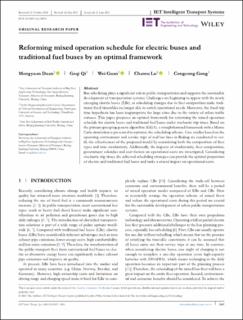| dc.contributor.author | Duan, Mengyuan | |
| dc.contributor.author | Qi, Geqi | |
| dc.contributor.author | Guan, Wei | |
| dc.contributor.author | Lu, Chaoru | |
| dc.contributor.author | Xie, Dongfan | |
| dc.date.accessioned | 2021-12-07T13:30:27Z | |
| dc.date.available | 2021-12-07T13:30:27Z | |
| dc.date.created | 2021-07-18T22:19:01Z | |
| dc.date.issued | 2021-07-03 | |
| dc.identifier.issn | 1751-956X | |
| dc.identifier.issn | 1751-9578 | |
| dc.identifier.uri | https://hdl.handle.net/11250/2833175 | |
| dc.description.abstract | Bus scheduling plays a significant role in public transportation and supports the sustainable development of transportation systems. Challenges are beginning to appear with the newly emerging electric buses (EBs), as scheduling changes due to fleet composition make traditional fixed timetables no longer able to satisfy operational needs. Moreover, the fixed-trip time hypothesis has been inappropriate for large cities due to the variety of urban traffic statuses. This paper proposes an optimal framework for reforming the mixed operation schedule for electric buses and traditional fuel buses under stochastic trip times. Based on the primary grouping genetic algorithm (GGA), a straightforward framework with a Monte Carlo simulation is presented to optimize the scheduling scheme. Case studies based on the operating environment and service trips of real bus lines in Beijing are conducted to verify the effectiveness of the proposed model by considering both the composition of fleet types and time stochasticity. Additionally, the impacts of stochasticity, fleet composition, government subsidies and cost factors on operational costs are investigated. Considering stochastic trip times, the achieved scheduling strategies can provide the optimal proportion of electric and traditional fuel buses and make a crucial impact on operational costs. | en_US |
| dc.description.sponsorship | This work was supported by the National Natural Science Foundation of China under Grants No. 71961137008; the Fundamental Research Funds for the Central Universities No.2020YJS096; the National Natural Science Foundation of China under Grants No. 71621001 and 91746201; JPI Urban Europe project ‘SMUrTS’ under Grant No. 299078. | en_US |
| dc.language.iso | eng | en_US |
| dc.publisher | Wiley Open Access | en_US |
| dc.relation.ispartofseries | IET Intelligent Transport Systems;Volume 15, Issue 10 | |
| dc.rights | Navngivelse 4.0 Internasjonal | * |
| dc.rights.uri | http://creativecommons.org/licenses/by/4.0/deed.no | * |
| dc.subject | Bus scheduling | en_US |
| dc.subject | Optimal frameworks | en_US |
| dc.subject | Electric buses | en_US |
| dc.subject | Collective transportation | en_US |
| dc.subject | Bus operation optimization | en_US |
| dc.title | Reforming mixed operation schedule for electric buses and traditional fuel buses by an optimal framework | en_US |
| dc.type | Peer reviewed | en_US |
| dc.type | Journal article | en_US |
| dc.description.version | publishedVersion | en_US |
| dc.rights.holder | © 2021 The Authors | en_US |
| cristin.ispublished | true | |
| cristin.fulltext | original | |
| cristin.qualitycode | 1 | |
| dc.identifier.doi | https://doi.org/10.1049/itr2.12098 | |
| dc.identifier.cristin | 1922053 | |
| dc.source.journal | IET Intelligent Transport Systems | en_US |
| dc.source.volume | 15 | en_US |
| dc.source.issue | 10 | en_US |
| dc.source.pagenumber | 1287-1303 | en_US |
| dc.relation.project | Norges forskningsråd: 299078 | en_US |

